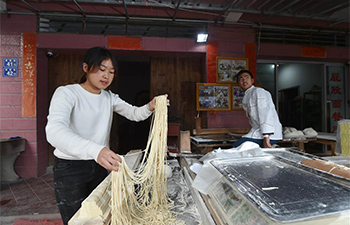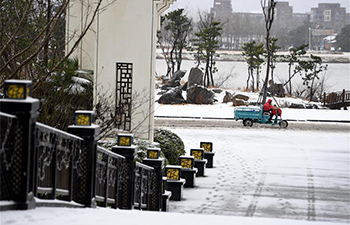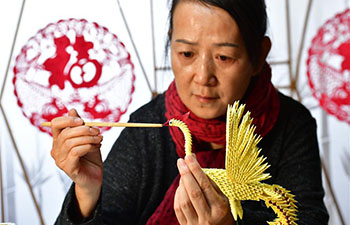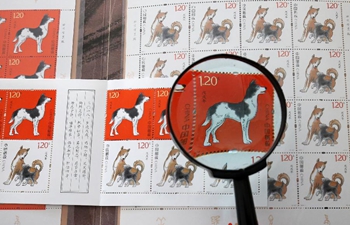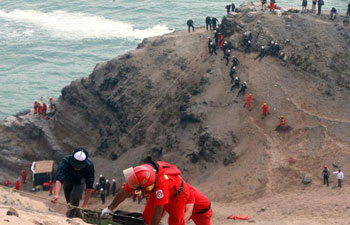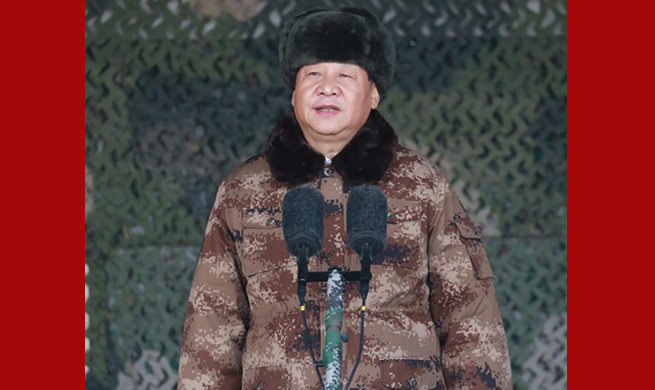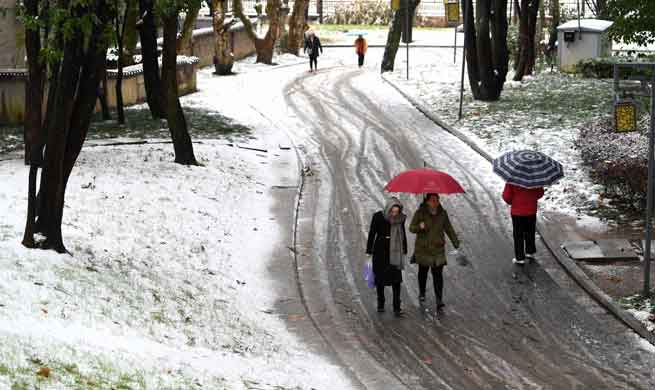ISTANBUL, Jan. 4 (Xinhua) -- As recent news reports suggest that Turkey may be seeking to create a Sunni-ruled area in Syria near its border, analysts warned against such a move on the grounds that it would invite trouble and lead to a confrontation with both Russia and the United States.
Should Turkey attempt such a thing, it would be forcefully driven out of Syria, cautioned Haldun Solmazturk, a former general with the Turkish military. "Russia would not accept a Sunni state-like entity under heavy Turkish sway," he told Xinhua.
Turkey's state-run Anadolu Agency reported last Saturday that around 30 sub-groups of the Ankara-backed Free Syrian Army (FSA) rebel group had united under the name of Syria's "national army," which has 22,000 soldiers in three corps and includes three brigades composed of Syrian Turkmens.
Jawad Abu Hatab, head of the so-called Syria's interim government, was quoted as saying that their main objective was to keep the areas captured by Turkish troops in Syria and defend people there against the Syrian government and terrorist organizations.
The Turkish military, backed by FSA rebels, launched a so-called Operation Euphrates Shield in northern Syria from August 2016 to March 2017, seizing several towns in its efforts to drive the Islamic State away and prevent the Kurdish cantons from uniting along the Turkish border.
"Turkey has neither the military nor economic or political power to keep part of Syrian territory in hand," argued Solmazturk, who chairs the Incek debates at the Ankara-based 21st Century Turkey Institute.
The indications suggest that Turkey intends to carve out a Sunni-held area in Syria and exercise control over it through the FSA, he said.
Numan Kurtulmus, then Turkish government spokesman, said about a year ago that Ankara would not hand over the territory seized by Turkish military to the Syrian government.
Roughly until the end of 2015, Turkey and the U.S. not only supported rebels in Syria, but also trained and equipped FSA militants in Turkey to topple the Syrian government.
Haitham Ofeisi, chief of General Staff of the so-called "national army," said the decision to establish the armed group was made with Ankara's support.
Syrian troops and terrorist groups would be cleared from the area and more "national army" troops would be formed in the areas to be liberated in the future, Ofeisi was quoted as saying by Anadolu.
The pro-government Yeni Safak daily said on Monday that the "national army" would also help Turkish troops drive Kurdish militia forces out of Afrin in northwestern Syria.
Top Turkish officials have repeatedly expressed Ankara's determination to cleanse the Kurdish militia, known as the People's Protection Units and seen by Turkey as terrorists, from Afrin and other areas along the Turkish border.
Turkey's move against Afrin and other cantons held by Syrian militia would face opposition not only from the Syrian government but also from both Russia and the U.S. as well, Faruk Logoglu, a former senior Turkish diplomat, told Xinhua.
For Solmazturk, a Turkish operation against Afrin with the support of the "national army" would amount to madness. "Both the U.S. and Russia would surely oppose that and clashes would break out," he said.
Until the summer of 2016, when Ankara started to mend ties with Moscow, a staunch supporter of Damascus in the Syrian civil war, Turkey supported Sunni rebel groups fighting to topple the Syrian government headed by President Bashar al-Assad.
Joining hands with Russia and Iran to broker a Syrian peace deal since last summer, Ankara has given up trying to oust al-Assad but kept saying he must leave.
Turkish President Recep Tayyip Erdogan suddenly raised his voice against al-Assad last week, calling him a terrorist. Accusing al-Assad of carrying out state terrorism in the war, Erdogan said the Syrian leader should not be allowed to remain in power.
"The deeper problem is that the Turkish government still lacks a consistent, steady Syria policy of its own," said Logoglu. "It vacillates between Russia and the U.S., between its commitment to Syria's territorial integrity and its wish to exercise long-term control through proxies over parts of Syria."
Syrian Foreign Minister Walid al-Moualem accused Ankara last month of having designs on Syria's territory, while Damascus sees the presence of Turkish troops on Syrian soil as occupation.
The "al-Assad must go" attitude assumed by the ruling Justice and Development Party in Turkey is in line with the U.S. position, though Ankara says "no" to Washington's military support to the Kurdish militia in Syria.
Arguing Turkey's vacillating policy in Syria has worked to its detriment, Logoglu said, "Turkey's policy should be to support a single Syria, with one flag, one army. Otherwise, Turkey is likely to face further isolation regarding Syria."




